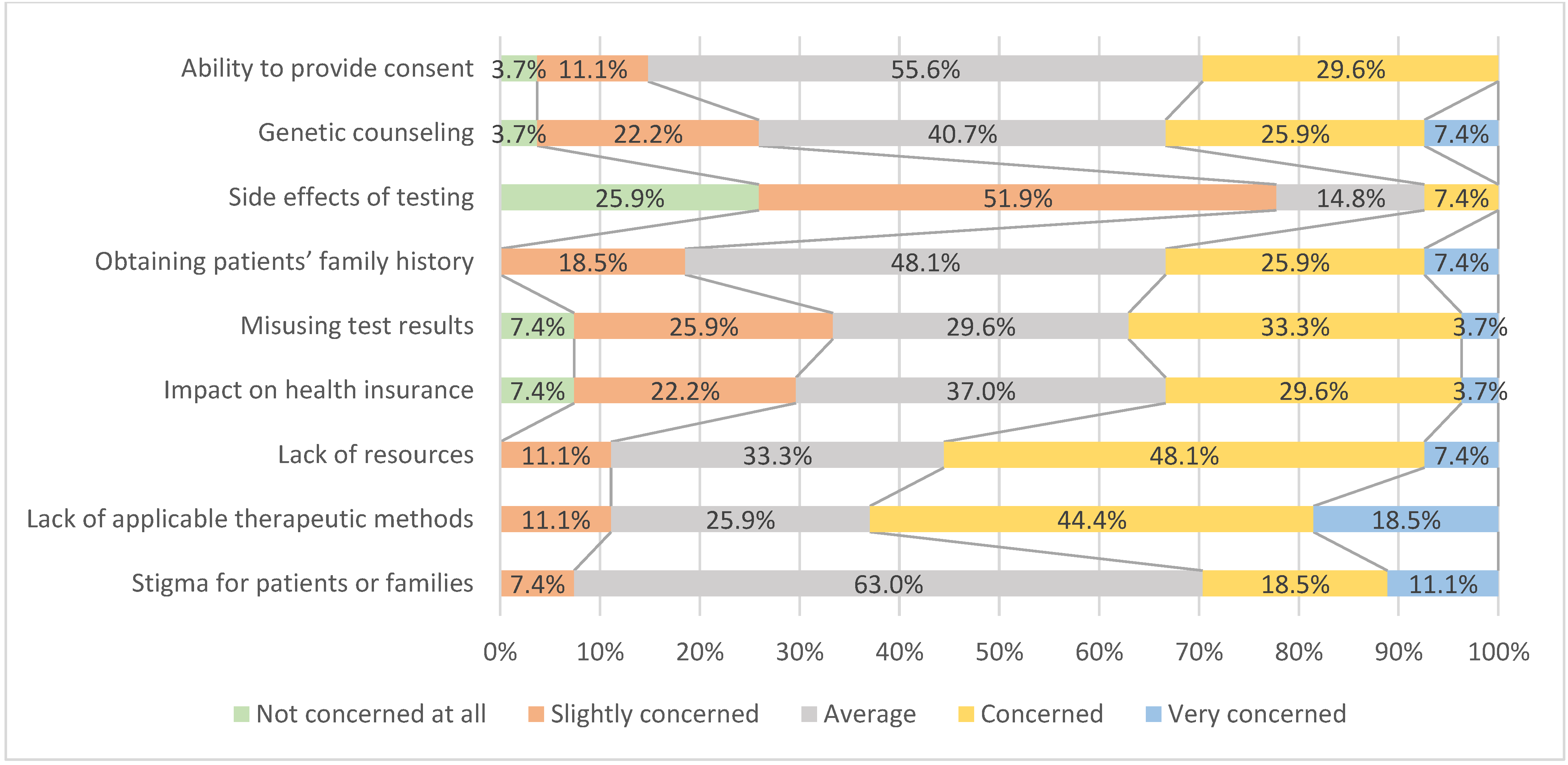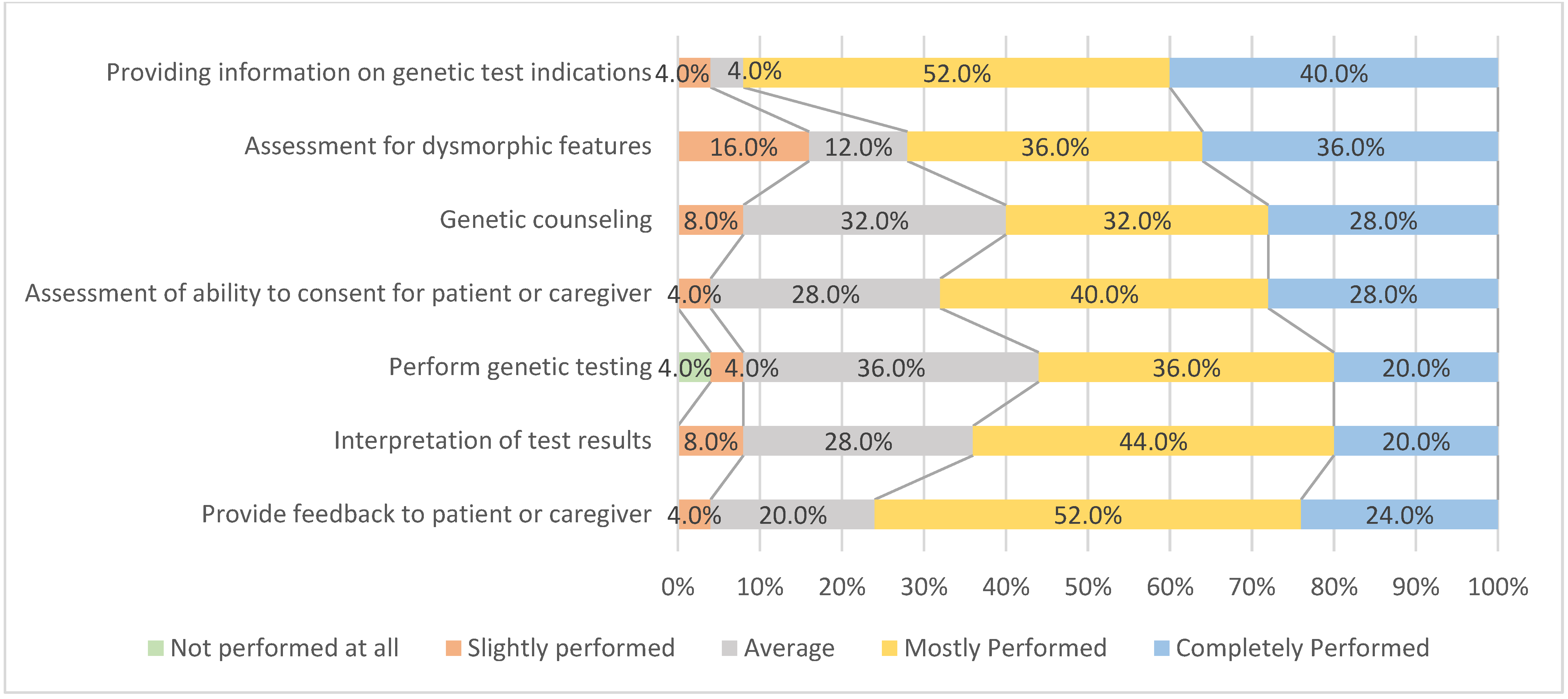Genetic Testing on Patients with Developmental Delay: A Preliminary Study from the Perspective of Physicians
Abstract
:1. Introduction
2. Method
2.1. Participants
2.2. Study Tools
2.3. Analysis Method
2.4. Ethical Consideration
3. Results
3.1. General Characteristics
3.2. Clinical Experience with Genetic Testing
3.3. Usefulness of Genetic Testing When Treating the Developmentally Disabled
3.4. Concerns Regarding the Provision of Genetic Testing Services
3.5. Implementation of Each Step When Conducting Genetic Testing
3.6. Reasons for Recommending Genetic Testing and Obstacles Faced
3.6.1. Reasons for Recommending Genetic Testing for People with Developmental Disabilities
- (1)
- Predict, prepare, and family planning
“If you know the name of the disease of the child, you can predict and prepare for the child’s future. There are certain genetic diseases that have a specific treatment method, so testing is absolutely necessary. It is also important for additional family planning.”(Participant 11)
“First, if confirmed through genetic testing, comorbidities can be diagnosed and treated early. Second, the prognosis of the patient can be identified so that medical resource allocation can be discussed. Third, it can predict hereditary potential and serve as a resource for genetic counseling in case the patient or their relative has a child.”(Participant 20)
- (2)
- Child rearing
“When a child has symptoms such as developmental delay, motor abnormality, or muscle weakness of unknown cause, a diagnosis can be determined via genetic testing. Accordingly, medications that can control the symptoms can be prescribed. In addition, genetic testing can provide the basis for preparing for a future at home, once the prognosis is determined, in terms of how much can be achieved after understanding the circumstances for rehabilitation. All this can be determined merely in response to a child falling behind at school. So, I always recommend genetic testing.”(Participant 24)
3.6.2. Obstacles Faced in Recommending Genetic Testing to Patients with Disabilities
- (1)
- High cost and lack of auxiliary tools
“The high cost of the test and the patient’s economic status may result in hesitation to undergo the test. I think the explanation of the test is conveyed mostly through the informed consent form, and an easy-to-understand information sheet is needed.”(Participant 1)
“Chromosomal microarray analysis, which is performed as a primary test for developmental delay, may be covered by insurance, but there is the economic burden of additional tests that may need to be performed. The lack of understanding by the parents about genetic testing and the lack of auxiliary explanatory tools may be reasons for their hesitance.”(Participant 13)
“Reasons for hesitance among disabled patients could include their economic status, the degree of understanding of the caregiver, lack of proper explanation, lack of auxiliary tools, lack of time, and lack of compensation for the time taken for proper explanation by the medical staff, and lack of experts who can provide repeated explanations.”(Participant 16)
- (2)
- Stigmatizing effect
“Parents are concerned that disability may affect their children’s prospects of marriage (stigma effect). First, elderly patients or their spouses are often afraid of confirmation through genetic testing due to concerns about their children’s marriage. Second, young adult patients also often postpone genetic testing until they are married. Third, in the case of patients with disabilities, if the test is not covered by insurance, the cost burden is high. Fourth, although there are various genetic diseases, it is difficult to obtain auxiliary tools, such as well-written brochures, with which patients can explain to their caregivers the purpose and benefits of genetic tests.”(Participant 21)
4. Discussion
5. Conclusions
Author Contributions
Funding
Institutional Review Board Statement
Informed Consent Statement
Data Availability Statement
Conflicts of Interest
References
- Lee, H.J.; Joo, H. The change of medical environment & wellness view in the era of the 4th industrial revolution. J. Korean Soc. Wellness 2017, 12, 215–223. [Google Scholar]
- Korea Law Information Center. Medical Act; Article 53 (New Health Technology Assessment). Available online: https://www.law.go.kr/%EB%B2%95%EB%A0%B9/%EC%9D%98%EB%A3%8C%EB%B2%95 (accessed on 1 March 2022).
- Quaternary Industrial Revolution Committee. Plan for Responding to the Quaternary Industrial Revolution: I-KOREA 4.0. Available online: https://policy.nl.go.kr/cmmn/FileDown.do?atchFileId=221994&fileSn=63436 (accessed on 2 March 2022).
- World Health Organization. International Classification of Functioning. Disability and Health. 2001. Available online: www.who.int/classifications/icf/en/ (accessed on 1 March 2022).
- Cahill, E.; Eggleston, R. Reconsidering the stigma of physical disability: Wheelchair use and public kindness. Sociol. Q. 1995, 36, 681–698. [Google Scholar] [CrossRef]
- World Bank Group. World Development Report 2016: Digital Dividends; World Bank Publications: Washington, DC, USA, 2016. [Google Scholar]
- Samant, D.; Matter, R.; Harniss, M. Realizing the potential of accessible ICTs in developing countries. Disabil. Rehabil. Assist. Technol. 2013, 8, 11–20. [Google Scholar] [CrossRef] [PubMed]
- Samant, D.; Narasimhan, N. Inclusive Disaster and Emergency Management for Persons with Disabilities. A Review of Needs, Challenges, Effective Policies, and Practices; The Centre for Internet and Society: Bangalore, India, 2013; pp. 1–61. [Google Scholar]
- Korea Law Information Center. Act of Health and Access to Medical Services for Persons with Disabilities. Available online: https://www.law.go.kr/%EB%B2%95%EB%A0%B9/%EC%9E%A5%EC%95%A0%EC%9D%B8%EA%B1%B4%EA%B0%95%EA%B6%8C%EB%B0%8F%EC%9D%98%EB%A3%8C%EC%A0%91%EA%B7%BC%EC%84%B1%EB%B3%B4%EC%9E%A5%EC%97%90%EA%B4%80%ED%95%9C%EB%B2%95%EB%A5%A0/ (accessed on 1 March 2022).
- United Nations. Convention on the Rights of Persons with Disabilities; United Nations: New York, NY, USA, 2006. [Google Scholar]
- Luxford, K.; Dana, G.; Delbanco, T. Promoting patient-centered care: A qualitative study of facilitators and barriers in healthcare organizations with a reputation for improving the patient experience. Int. J. Qual. Health Care 2011, 23, 510–515. [Google Scholar] [CrossRef] [Green Version]
- Kang, H.; Yeon, K.; Han, S.-T. A review on the use of effect size in nursing research. J. Korean Acad. Nurs. 2015, 45, 641–649. [Google Scholar] [CrossRef] [Green Version]
- Wolfe, K.; Stueber, K.; McQuillin, A.; Jichi, F.; Patch, C.; Flinter, F.; Strydom, A.; Bass, N. Genetic testing in intellectual disability psychiatry: Opinions and practices of UK child and intellectual disability psychiatrists. J. Appl. Res. Intellect. Disabil. 2018, 31, 273–284. [Google Scholar] [CrossRef] [PubMed] [Green Version]
- Ryu, H.M. Clinical Guidelines for Post-Birth Chromosome Microarray Testing. Available online: https://guideline.or.kr/guide/view.php?number=1125&cate=A (accessed on 1 March 2022).
- Barton, K.S.; Tabor, H.K.; Starks, H.; Garrison, N.A.; Laurino, M.; Burke, W. Pathways from autism spectrum disorder diagnosis to genetic testing. Genet Med. 2018, 20, 737–744. [Google Scholar] [CrossRef] [PubMed] [Green Version]
- Agency for Healthcare Research and Quality. Genetic Testing for Developmental and Intellectual Disabilities; Effective Health Care Program, Agency for Healthcare Research and Quality: Rockville, MD, USA. Available online: https://effectivehealthcare.ahrq.gov/products/genetic-testing-developmental-disabilities/research-protocol (accessed on 1 March 2022).
- Strnadová, I.; Nevin, S.M.; Scully, J.L.; Palmer, E.E. The opinions and experiences of people with intellectual disability regarding genetic testing and genetic medicine: A systematic review. Genet. Med. 2022, 24, 535–548. [Google Scholar] [CrossRef] [PubMed]
- Watson, J.; Anderson, J.; Wilson, E.; Anderson, K.L. The impact of the United Nations Convention on the Rights of Persons with Disabilities (CRPD) on Victorian guardianship practice. Disabil. Rehabil. 2020, 44, 2806–2814. [Google Scholar] [CrossRef] [PubMed]
- Kohn, N.A.; Blumenthal, J.A. A critical assessment of supported decision-making for persons aging with intellectual disabilities. Disabil. Health J. 2014, 7, S40–S43. [Google Scholar] [CrossRef] [PubMed]
- Korea Law Information Center. Enforcement Regulations of Bioethics and Safety Act [Appendix Form No. 46]. Available online: https://www.law.go.kr/%EB%B2%95%EB%A0%B9/%EC%83%9D%EB%AA%85%EC%9C%A4%EB%A6%AC%EB%B0%8F%EC%95%88%EC%A0%84%EC%97%90%EA%B4%80%ED%95%9C%EB%B2%95%EB%A5%A0%EC%8B%9C%ED%96%89%EA%B7%9C%EC%B9%99 (accessed on 20 March 2022).
- Korea Law Information Center. Enforcement Regulations of the Bioethics and Safety Act [Appendix Form No. 52]. Available online: https://www.law.go.kr/%EB%B2%95%EB%A0%B9/%EC%83%9D%EB%AA%85%EC%9C%A4%EB%A6%AC%EB%B0%8F%EC%95%88%EC%A0%84%EC%97%90%EA%B4%80%ED%95%9C%EB%B2%95%EB%A5%A0%EC%8B%9C%ED%96%89%EA%B7%9C%EC%B9%99 (accessed on 20 March 2022).
- Korea Law Information Center. Act on Welfare of Persons with Disabilities; Article 25 (Raising Social Awareness). Available online: https://www.law.go.kr/%EB%B2%95%EB%A0%B9/%EC%9E%A5%EC%95%A0%EC%9D%B8%EB%B3%B5%EC%A7%80%EB%B2%95 (accessed on 20 March 2022).
- Korea Law Information Center. Act on The Prohibition of Discrimination against Persons with Disabilities and Remedy against Infringement of Their Rights; Article 32 (Prevention of Harassment). Available online: https://www.law.go.kr/%EB%B2%95%EB%A0%B9/%EC%9E%A5%EC%95%A0%EC%9D%B8%EC%B0%A8%EB%B3%84%EA%B8%88%EC%A7%80%EB%B0%8F%EA%B6%8C%EB%A6%AC%EA%B5%AC%EC%A0%9C%EB%93%B1%EC%97%90%EA%B4%80%ED%95%9C%EB%B2%95%EB%A5%A0 (accessed on 20 March 2022).
- Korea Law Information Center. Act on The Employment Promotion and Vocational Rehabilitation of Persons with Disabilities; Article 5-2 (Workplace Education for Improving Awareness of Persons with Disabilities). Available online: https://www.law.go.kr/%EB%B2%95%EB%A0%B9/%EC%9E%A5%EC%95%A0%EC%9D%B8%EA%B3%A0%EC%9A%A9%EC%B4%89%EC%A7%84%EB%B0%8F%EC%A7%81%EC%97%85%EC%9E%AC%ED%99%9C%EB%B2%95 (accessed on 20 March 2022).


| Major | Specialization | Number of Respondents (Participants, %) | Mean Clinical Experience after Becoming a Specialist (Years) |
|---|---|---|---|
| Department of Rehabilitation | Pediatric Rehabilitation | 10 (37.0) | 11.3 |
| Neurorehabilitation | 6 (22.2) | 13.7 | |
| Department of Pediatrics | Pediatric Neurology | 8 (29.6) | 9.8 |
| Genomic/Metabolic Disease | 1 (3.7) | 12 | |
| Department of Obstetrics and Gynecology | Maternal/Fetal Care | 2 (7.4) | 13.5 |
| Total and mean | 27 (100%) | 11.7 | |
| Questions | N | Yes | No |
|---|---|---|---|
| 1. Have you provided medical treatment for a patient with disability in the past 12 months? | 27 | 25 (92.6) | 2 (7.4) |
| 2. Have you recommended genetic testing to a patient with disability in the past 12 months? | 25 * | 24 (96.0) | 1 (4.0) |
| 3. Do you use communication tools (video media, easy-to-read brochures, etc.) during genetic testing consultations to help patients make informed decisions? | 24 * | 12 (50.0) | 12 (50.0) |
| 4. Have you faced obstacles while conducting genetic testing for patients with disability and their families? | 24 * | 24 (100.0) | 0 (0.0) |
| Question | N | M ± SD |
|---|---|---|
| 1. Is genetic testing helpful in providing medical services to patients with disability? | 27 | 4.37 ± 0.69 |
| 2. How helpful do you think a genetic diagnosis is for patients with disability? | 27 | 4.11 ± 0.58 |
| 3. How helpful do you think a genetic diagnosis is for the families of patients with disability? | 27 | 4.00 ± 0.56 |
| 4. Did the information obtained from genetic testing cause a change in the patient’s healthcare? | 24 * | 3.67 ± 0.82 |
Publisher’s Note: MDPI stays neutral with regard to jurisdictional claims in published maps and institutional affiliations. |
© 2022 by the authors. Licensee MDPI, Basel, Switzerland. This article is an open access article distributed under the terms and conditions of the Creative Commons Attribution (CC BY) license (https://creativecommons.org/licenses/by/4.0/).
Share and Cite
Bang, G.; Lee, S.J.; Lee, B.; Park, M.; Park, S.-Y. Genetic Testing on Patients with Developmental Delay: A Preliminary Study from the Perspective of Physicians. Healthcare 2022, 10, 1236. https://doi.org/10.3390/healthcare10071236
Bang G, Lee SJ, Lee B, Park M, Park S-Y. Genetic Testing on Patients with Developmental Delay: A Preliminary Study from the Perspective of Physicians. Healthcare. 2022; 10(7):1236. https://doi.org/10.3390/healthcare10071236
Chicago/Turabian StyleBang, Gwanwook, Sook Joung Lee, Bomyee Lee, Minji Park, and So-Youn Park. 2022. "Genetic Testing on Patients with Developmental Delay: A Preliminary Study from the Perspective of Physicians" Healthcare 10, no. 7: 1236. https://doi.org/10.3390/healthcare10071236
APA StyleBang, G., Lee, S. J., Lee, B., Park, M., & Park, S.-Y. (2022). Genetic Testing on Patients with Developmental Delay: A Preliminary Study from the Perspective of Physicians. Healthcare, 10(7), 1236. https://doi.org/10.3390/healthcare10071236






